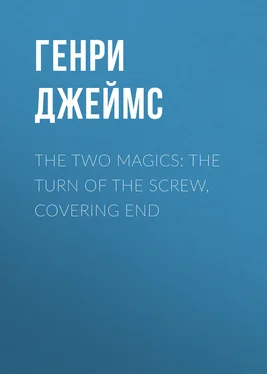Генри Джеймс - The Two Magics - The Turn of the Screw, Covering End
Здесь есть возможность читать онлайн «Генри Джеймс - The Two Magics - The Turn of the Screw, Covering End» — ознакомительный отрывок электронной книги совершенно бесплатно, а после прочтения отрывка купить полную версию. В некоторых случаях можно слушать аудио, скачать через торрент в формате fb2 и присутствует краткое содержание. Жанр: Эзотерика, foreign_antique, foreign_prose, на английском языке. Описание произведения, (предисловие) а так же отзывы посетителей доступны на портале библиотеки ЛибКат.
- Название:The Two Magics: The Turn of the Screw, Covering End
- Автор:
- Жанр:
- Год:неизвестен
- ISBN:нет данных
- Рейтинг книги:5 / 5. Голосов: 1
-
Избранное:Добавить в избранное
- Отзывы:
-
Ваша оценка:
- 100
- 1
- 2
- 3
- 4
- 5
The Two Magics: The Turn of the Screw, Covering End: краткое содержание, описание и аннотация
Предлагаем к чтению аннотацию, описание, краткое содержание или предисловие (зависит от того, что написал сам автор книги «The Two Magics: The Turn of the Screw, Covering End»). Если вы не нашли необходимую информацию о книге — напишите в комментариях, мы постараемся отыскать её.
The Two Magics: The Turn of the Screw, Covering End — читать онлайн ознакомительный отрывок
Ниже представлен текст книги, разбитый по страницам. Система сохранения места последней прочитанной страницы, позволяет с удобством читать онлайн бесплатно книгу «The Two Magics: The Turn of the Screw, Covering End», без необходимости каждый раз заново искать на чём Вы остановились. Поставьте закладку, и сможете в любой момент перейти на страницу, на которой закончили чтение.
Интервал:
Закладка:
“It does strike me that my pupils have never mentioned–”
She looked at me hard as I musingly pulled up. “His having been here and the time they were with him?”
“The time they were with him, and his name, his presence, his history, in any way.”
“Oh, the little lady doesn’t remember. She never heard or knew.”
“The circumstances of his death?” I thought with some intensity. “Perhaps not. But Miles would remember—Miles would know.”
“Ah, don’t try him!” broke from Mrs. Grose.
I returned her the look she had given me. “Don’t be afraid.” I continued to think. “It is rather odd.”
“That he has never spoken of him?”
“Never by the least allusion. And you tell me they were ‘great friends’?”
“Oh, it wasn’t him !” Mrs. Grose with emphasis declared. “It was Quint’s own fancy. To play with him, I mean—to spoil him.” She paused a moment; then she added: “Quint was much too free.”
This gave me, straight from my vision of his face— such a face!—a sudden sickness of disgust. “Too free with my boy?”
“Too free with everyone!”
I forbore, for the moment, to analyse this description further than by the reflection that a part of it applied to several of the members of the household, of the half-dozen maids and men who were still of our small colony. But there was everything, for our apprehension, in the lucky fact that no discomfortable legend, no perturbation of scullions, had ever, within anyone’s memory, attached to the kind old place. It had neither bad name nor ill fame, and Mrs. Grose, most apparently, only desired to cling to me and to quake in silence. I even put her, the very last thing of all, to the test. It was when, at midnight, she had her hand on the schoolroom door to take leave. “I have it from you then—for it’s of great importance—that he was definitely and admittedly bad?”
“Oh, not admittedly. I knew it—but the master didn’t.”
“And you never told him?”
“Well, he didn’t like tale-bearing—he hated complaints. He was terribly short with anything of that kind, and if people were all right to him ——”
“He wouldn’t be bothered with more?” This squared well enough with my impression of him: he was not a trouble-loving gentleman, nor so very particular perhaps about some of the company he kept. All the same, I pressed my interlocutress. “I promise you I would have told!”
She felt my discrimination. “I dare say I was wrong. But, really, I was afraid.”
“Afraid of what?”
“Of things that man could do. Quint was so clever—he was so deep.”
I took this in still more than, probably, I showed. “You weren’t afraid of anything else? Not of his effect–?”
“His effect?” she repeated with a face of anguish and waiting while I faltered.
“On innocent little precious lives. They were in your charge.”
“No, they were not in mine!” she roundly and distressfully returned. “The master believed in him and placed him here because he was supposed not to be well and the country air so good for him. So he had everything to say. Yes”—she let me have it—“even about them .”
“Them—that creature?” I had to smother a kind of howl. “And you could bear it!”
“No. I couldn’t—and I can’t now!” And the poor woman burst into tears.
A rigid control, from the next day, was, as I have said, to follow them; yet how often and how passionately, for a week, we came back together to the subject! Much as we had discussed it that Sunday night, I was, in the immediate later hours in especial—for it may be imagined whether I slept—still haunted with the shadow of something she had not told me. I myself had kept back nothing, but there was a word Mrs. Grose had kept back. I was sure, moreover, by morning, that this was not from a failure of frankness, but because on every side there were fears. It seems to me indeed, in retrospect, that by the time the morrow’s sun was high I had restlessly read into the facts before us almost all the meaning they were to receive from subsequent and more cruel occurrences. What they gave me above all was just the sinister figure of the living man—the dead one would keep awhile!—and of the months he had continuously passed at Bly, which, added up, made a formidable stretch. The limit of this evil time had arrived only when, on the dawn of a winter’s morning, Peter Quint was found, by a labourer going to early work, stone dead on the road from the village: a catastrophe explained—superficially at least—by a visible wound to his head; such a wound as might have been produced—and as, on the final evidence, had been—by a fatal slip, in the dark and after leaving the public house, on the steepish icy slope, a wrong path altogether, at the bottom of which he lay. The icy slope, the turn mistaken at night and in liquor, accounted for much—practically, in the end and after the inquest and boundless chatter, for everything; but there had been matters in his life—strange passages and perils, secret disorders, vices more than suspected—that would have accounted for a good deal more.
I scarce know how to put my story into words that shall be a credible picture of my state of mind; but I was in these days literally able to find a joy in the extraordinary flight of heroism the occasion demanded of me. I now saw that I had been asked for a service admirable and difficult; and there would be a greatness in letting it be seen—oh, in the right quarter!—that I could succeed where many another girl might have failed. It was an immense help to me—I confess I rather applaud myself as I look back!—that I saw my service so strongly and so simply. I was there to protect and defend the little creatures in the world the most bereaved and the most loveable, the appeal of whose helplessness had suddenly become only too explicit, a deep, constant ache of one’s own committed heart. We were cut off, really, together; we were united in our danger. They had nothing but me, and I—well, I had them . It was in short a magnificent chance. This chance presented itself to me in an image richly material. I was a screen—I was to stand before them. The more I saw, the less they would. I began to watch them in a stifled suspense, a disguised excitement that might well, had it continued too long, have turned to something like madness. What saved me, as I now see, was that it turned to something else altogether. It didn’t last as suspense—it was superseded by horrible proofs. Proofs, I say, yes—from the moment I really took hold.
This moment dated from an afternoon hour that I happened to spend in the grounds with the younger of my pupils alone. We had left Miles indoors, on the red cushion of a deep window-seat; he had wished to finish a book, and I had been glad to encourage a purpose so laudable in a young man whose only defect was an occasional excess of the restless. His sister, on the contrary, had been alert to come out, and I strolled with her half an hour, seeking the shade, for the sun was still high and the day exceptionally warm. I was aware afresh, with her, as we went, of how, like her brother, she contrived—it was the charming thing in both children—to let me alone without appearing to drop me and to accompany me without appearing to surround. They were never importunate and yet never listless. My attention to them all really went to seeing them amuse themselves immensely without me: this was a spectacle they seemed actively to prepare and that engaged me as an active admirer. I walked in a world of their invention—they had no occasion whatever to draw upon mine; so that my time was taken only with being, for them, some remarkable person or thing that the game of the moment required and that was merely, thanks to my superior, my exalted stamp, a happy and highly distinguished sinecure. I forget what I was on the present occasion; I only remember that I was something very important and very quiet and that Flora was playing very hard. We were on the edge of the lake, and, as we had lately begun geography, the lake was the Sea of Azof.
Читать дальшеИнтервал:
Закладка:
Похожие книги на «The Two Magics: The Turn of the Screw, Covering End»
Представляем Вашему вниманию похожие книги на «The Two Magics: The Turn of the Screw, Covering End» списком для выбора. Мы отобрали схожую по названию и смыслу литературу в надежде предоставить читателям больше вариантов отыскать новые, интересные, ещё непрочитанные произведения.
Обсуждение, отзывы о книге «The Two Magics: The Turn of the Screw, Covering End» и просто собственные мнения читателей. Оставьте ваши комментарии, напишите, что Вы думаете о произведении, его смысле или главных героях. Укажите что конкретно понравилось, а что нет, и почему Вы так считаете.












